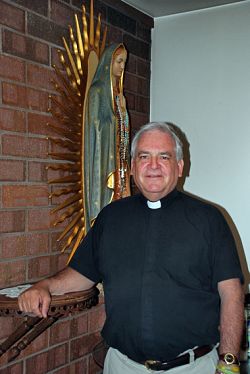‘Each new conflict’ in region ‘reopens old wounds,’ says Chaldean Catholic archbishop in Iraq

MIDVALE — Father Martin Diaz, pastoral administrator of St. Therese of the Child Jesus Parish, Midvale, and a member of the Diocese of Salt Lake City’s Peace and Justice Commission, took his concerns about the hot-button issue of immigration to Washington. "Actually, the church called me to Washington," Fr. Diaz said. "I was invited to attend seminars on ‘Justice for Immigrants,’ the Catholic Campaign for Immigration Reform." Armed with a letter to Utah’s lone Democratic Senator, Jim Matheson, from Midvale Mayor JoAnn Seghini, a member of St. Therese Parish, and representing the Diocese of Salt Lake City, Fr. Diaz also dropped in on the offices of three of Utah five representatives. He is hoping to speak to them or their representatives about the legal quagmire in which 12 million undocumented people in America are caught. These days, having crossed the border into the United States not only makes one "an illegal," it makes one "a criminal." Political pundits on every Sunday morning talk show throw the word "amnesty" around as though it is the last thing anyone working in this country and paying into the tax system should be given. Take two proposals regarding applying for permanent residency, for example. Both the White House and the House of Representatives have put forward proposals regarding comprehensive immigration reform. Fr. Diaz’ concern lies with which one of the proposals is most consistent with the United States Conference of Catholic Bishops (USCCB) principles for immigration reform. "H.R. 1645, (the STRIVE Act) introduced by Representatives Jeff Flake (R-Ariz.,) and Louis Gutierrez (D-Ill.) is closer to the the USCCB principles than is the White House proposal," Fr. Diaz said. Quoting a position paper by the USCCB, he said, "The test here is that any earned legalization program should not be so onerous as to discourage participation and must be fair, workable, and achievable. The formula here meets this test, provided that the ‘touch-back’ provision (the requirement that all applicants return to their countries of origin and re-entering the United States legally), which only requires leaving the U.S. briefly and re-entering does not change. Since it is only leaving the country while being processed here, and it can be done over a six-year period, it can be achievable and workable." Comparably, the White House proposal "would take an undue amount of time, as much as 20 years... to obtain permanent residency." And making the borders more secure? Fr. Diaz said the United States should be looking at making our borders more crossable, instead. "If our borders were more crossable, some people would come here to work for a time, then return home. That way they can maintain their families, and they wouldn’t face such difficult and dangerous crossings. "The laws we have now are hostile to families," he said. "Mom and Dad may come into this country illegally just searching for a way to survive. They may have children born in the U.S. If one or both parents are deported, it splits the family in half, often leaving children without parents at all." Fr. Diaz said he believes most immigrants come to the U.S. seeking economic security. "They contribute to our society, and they want to work." Another approach to comprehensive immigration reform that isn’t being widely examined, he said, is finding ways to improve the economies of the countries from which the immigrants are coming. "In any event, expecting 12 million people to return to their countries is simply absurd," he said. "People are realizing that immigrants make valuable contributions to this country, and they do contribute to our tax base. We need to work toward legislation that is closer to the bishops’ principles; a family-based system that is more than voluntary servitude. We need to bring these people out of the shadows.
© Copyright 2025 The Diocese of Salt Lake City. All rights reserved.

Stay Connected With Us